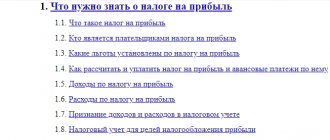When a branch of a foreign company becomes a payer of Russian taxes
The occurrence of tax obligations for a branch of a foreign company depends on:
- on its tax status in the Russian Federation;
- from the moment of its formation on Russian territory.
From the point of view of paragraph 2 of Art. 306 of the Tax Code of the Russian Federation, a branch opened by a foreign company on the territory of our country is qualified for tax purposes as a permanent establishment (hereinafter referred to as PE) (see diagram):
PP has the following characteristics:
- isolation - territorial distance from the head division of the foreign company that opened it (presence of a place of business in the Russian Federation);
- commercial purpose of the activity;
- “profitable” regularity is the implementation of activities aimed at systematically generating profit.
The presence of the above characteristics in a branch necessitates:
- register with the tax authorities of the Russian Federation;
- pay taxes to the Russian budget.
The material “State Tax Policy for 2016–2018” will introduce you to the directions of tax policy of the Russian Federation at the present stage.
An important nuance for the purposes of taxation of a private enterprise is the moment of its formation on the territory of the Russian Federation (see table below).
| Type of activity of the PP | The moment of formation of PP in Russia | Article of the Tax Code of the Russian Federation |
| Nature management | The PP is considered formed from the earlier of the dates:
| Paragraph 2 p. 3 art. 306 |
| Construction | The beginning of the construction site operation is considered to be the earlier of the following dates:
| Clause 3 art. 308 |
| Other commercial activities of a foreign company through a PP in the Russian Federation | The first day of business activity in the Russian Federation | Paragraph 1 item 3 Art. 306 |
Find out what tax obligations arise from the moment of formation of a private enterprise in the following sections.
Accounting policy of a representative office (branch) of a foreign company
Branches and representative offices of foreign organizations located on the territory of the Russian Federation can formulate accounting policies in accordance with Russian accounting standards, or based on the rules established in the country of location of the foreign organization, if the latter do not contradict International Financial Reporting Standards.
If a branch conducts commercial activities and receives income on the territory of the Russian Federation, then the preparation of tax accounting policies is mandatory in accordance with the tax legislation of the Russian Federation.
Tax obligations of a branch of a foreign company
When calculating and paying income tax, PEs should be guided by:
- Tax Code of the Russian Federation (Articles 306–312);
- international treaties containing provisions relating to taxation issues (Article 7 of the Tax Code of the Russian Federation).
If an international treaty contains different rules and norms regarding taxation than those provided for in the Tax Code of the Russian Federation, the provisions of the international treaty apply.
The procedure for fulfilling tax obligations is described in paragraph 8 of Art. 307 of the Tax Code of the Russian Federation and includes:
- calculation according to the norms of Russian legislation and payment of income tax to the budget of the Russian Federation;
- Submission of tax returns and reports on the activities of the PP to tax authorities.
To determine the amount of income tax, you should be guided by Art. 307 of the Tax Code of the Russian Federation, which establishes the main elements necessary for calculating tax:
- schemes for determining the tax base: from entrepreneurial activities (NBPA):
NBPD = Dpp – Rpp,
Where:
DPP and RPP - income received by a foreign company on the territory of the Russian Federation through a PP and expenses incurred by the PP;
- from ownership, use and (or) disposal of property (NBI):
NBI = Di – Ri,
Where:
Di and Ri - income from ownership, use and (or) disposal of property and expenses associated with their receipt;
- upon receipt of income related to PP from Russian sources specified in paragraph 1 of Art. 309 Tax Code of the Russian Federation;
- income tax rates are determined in Art. 284 Tax Code of the Russian Federation.
For detailed information on income tax rates, see the material “Art. 284 Tax Code of the Russian Federation (2017): questions and answers" .
IP income is included in income tax calculations, regardless of the form of receipt:
- in kind;
- in the form of debt forgiveness;
- by paying off obligations;
- as an offset to claims.
Under what conditions can offset be carried out? Find out from the article “Postings Dt 76 and Kt 76, 51, 91 (nuances)”.
We will discuss in the next section what features a business owner may encounter when calculating income tax.
Income tax for foreign organizations
In accordance with the Tax Code of the Russian Federation, foreign organizations conducting their activities in the Russian Federation through permanent representative offices and (or) receiving income from sources in the Russian Federation are recognized as taxpayers of income tax.
For foreign organizations, profit is income received through a permanent representative office, reduced by the amount of expenses incurred by this representative office that are economically justified. The representative office will be able to take into account for tax purposes only those expenses that are aimed at supporting its activities in the Russian Federation. Such expenses must be documented and incurred to carry out activities aimed at generating income.
Nuances of taxation of a permanent establishment of a foreign company
The amount of income tax depends on the income received by the PP, as well as on the expenses taken into account. The specified estimated components are included in the tax base, taking into account the following:
- income includes only income related to the activities of this PP - any income of the PP must be considered personally and attributed to the income of the PP if it is received from the activities of the PP and (or) as a result of the use of its assets;
- PP expenses are subject to the following requirements: reasonableness;
- economic justification;
- monetary valuation;
- documentary evidence.
Possible types of PP expenses are presented in the figure:
Peculiarities of Russian tax legislation in the tax calculations of foreign companies can be found in the material “Nuances of calculating income tax by foreign organizations.”
When calculating tax liabilities, special attention must be paid to the provisions of international treaties and agreements regarding the nuances of recognition of elements involved in the calculation of income tax. The table below provides examples of the features of recognition of such elements under individual contracts (agreements, conventions):
| Details of the international treaty for the avoidance of double taxation | Parties to the agreement | Features of recognition of profits, income and expenses | Link to the contract article |
| From 06/17/1992 | RF - USA | A justified distribution of documented expenses is allowed between the head office of a foreign company (in the country of its registration) and the PE opened by it in Russia. These include expenses:
| Clause 3 art. 6 |
Business profits include profits such as:
| Art. 5 tbsp. 6 | ||
| From 07/07/2004 | RF - Mexico | Any amounts (except for those paid in the form of compensation for expenses incurred) paid by a permanent establishment to the head office in the form of:
| Clause 3 art. 7 |
| From 02/11/2007 | RF - Saudi Arabia | When calculating profit from business activities, the following income is taken into account:
| Clause 4 art. 7 |
| From 05/29/1996 | RF - Germany | In exceptional cases, it is possible to determine the profit of a private enterprise by distributing the total profit among all its divisions, if:
| Clause 4 art. 7 |
The following materials will tell you how the tax regime affects the calculation of tax liabilities:
- “What income is recognized (accounted for) under the simplified tax system?”;
- “Basic yield under the patent tax system in 2017.”;
- “Distribution of expenses when combining UTII and simplified tax system”;
- “List of expenses that are taken into account when calculating the unified agricultural tax”.
Peculiarities of a foreign branch performing the functions of a tax agent
The work of the PP involves the fulfillment of the duty of a tax agent if the PP pays income to its employees and individuals hired under GPC agreements. In this case, the PP must be guided by Russian tax legislation, which provides for the following:
- personal income tax is calculated according to the norms of art. 224 Tax Code of the Russian Federation;
- personal income tax is subject to calculation and payment in respect of all income the source of which is PP;
- payments and remunerations accrued by PP in favor of its employees and other individuals are subject to insurance contributions.
A separate division of a foreign company may also have other tax obligations if it does not have its own current account and pays salaries to employees through the current account of another division of this foreign company. In this case, it will not be able to withhold personal income tax from the amounts issued and issue a payment order for the transfer of personal income tax to the budget.
In such a situation, the algorithm provided for in paragraph 5 of Art. 226 of the Tax Code of the Russian Federation, - the unit notifies tax authorities of the impossibility of withholding personal income tax. The following requirements apply to the message:
- drawn up in writing;
- presented to the tax authorities at the place of registration of the unit;
- contains information about the amount of income from which tax is not withheld and the amount of personal income tax not withheld;
- The deadline for sending a message is March 1 of the year following the expired tax period.
A similar situation was discussed in the letter of the Ministry of Finance dated May 22, 2009 No. 03-04-06-02/38.
Find out about the functions of tax agents and the possible consequences of their failure to perform them from the articles:
- “Tax agent for personal income tax: who is, responsibilities and BCC”;
- "St. 226 of the Tax Code of the Russian Federation (2017): questions and answers.”
How to organize branch reporting to avoid tax claims
In addition to the income tax return (its submission is mandatory even if the indicators are zero) and the report on the activities of the PE, you will need to submit other reporting forms and information to the tax authorities. For example:
- property declarations (if there is real estate, transport, land);
- “salary” certificates and calculations (6-NDFL, 2-NDFL, etc.);
- VAT declarations (including the submission of copies of them to the tax authorities at the place of registration with confirming marks of the tax authority through which the centralized calculation and payment of VAT takes place - if the PE has switched to a centralized system of calculation and payment of VAT through a branch in another region of the Russian Federation);
- information on the average number of employees for the previous year, etc.
If the activities of a private enterprise involve tax risks, it can follow the recommendations of tax authorities, which are as follows:
- exclude questionable transactions when calculating tax liabilities;
- notify controllers of measures taken to reduce risks (clarification of tax obligations) by submitting updated tax returns for taxes for periods of activity with a high tax risk;
- submit to the tax authorities an explanatory note along with clarifications (its form is given in Appendix No. 5 to the order of the Federal Tax Service of Russia dated May 30, 2007 No. MM-3-06 / [email protected] ).
How an economic entity can take into account the impact of risks of various types, see the articles:
- “What are the tax risks of an organization?”;
- “Occupational risk class according to OKVED 2016”;
- “The tax authorities will divide all VAT payers into risk groups and build a “tree of connections””.
Property tax for foreign organizations
If a permanent establishment is endowed with fixed assets recorded on its balance sheet, an obligation arises to calculate and pay property tax. The objects of taxation for foreign organizations operating in the Russian Federation through permanent representative offices are movable and immovable property related to fixed assets, property received under a concession agreement. Movable property accepted for registration on January 1, 2013 is not subject to taxation.
From January 1, 2022, organizations must pay movable property tax in accordance with Federal Law No. 335-FZ dated November 27, 2017. An exception is made only for payers of the simplified tax system and UTII, exempt from paying property tax (except for objects that are included in the cadastral lists of regions) . The issue of providing movable property tax benefits is decided individually, at the level of each region. If the region does not adopt its law on benefits, then in 2022 firms will pay tax on movable property registered after January 1, 2013, at a rate of 1.1 percent. Read more in the article - Corporate property tax 2022.
Results
The taxation of a foreign representative office in Russia depends on whether or not it is recognized as a permanent establishment for tax purposes.
If a branch of a foreign company in Russia meets the criteria of a permanent establishment, the principles for calculating its tax liabilities are similar to those applied by Russian companies, taking into account the provisions of international treaties.
You can find more complete information on the topic in ConsultantPlus. Free trial access to the system for 2 days.









